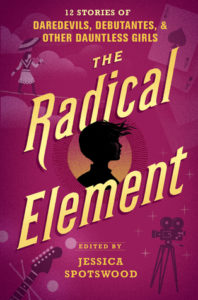 Short story anthologies for teen readers have enjoyed a resurgence lately. One of the pioneers of this genre was A Tyranny of Petticoats, edited by Jessica Spotswood, which appeared in 2015. Spotswood and a new batch of contributors bring us more stories this month in The Radical Element: 12 Stories of Daredevils, Debutantes & Other Dauntless Girls. Here, the “radical” girls resist their status as outsiders in a number of ways. Sometimes survival is resistance enough. In other cases, they take part in movements to change the course of history.
Short story anthologies for teen readers have enjoyed a resurgence lately. One of the pioneers of this genre was A Tyranny of Petticoats, edited by Jessica Spotswood, which appeared in 2015. Spotswood and a new batch of contributors bring us more stories this month in The Radical Element: 12 Stories of Daredevils, Debutantes & Other Dauntless Girls. Here, the “radical” girls resist their status as outsiders in a number of ways. Sometimes survival is resistance enough. In other cases, they take part in movements to change the course of history.
For this anthology, Spotswood has sought out own voices contributors who shed light on lesser-known communities. Among them are the Sephardic Jews of early nineteenth century Savannah, Georgia, trying to maintain their population and traditions in Dahlia Adler’s “Daughters of the Book,” and the tiny band of Mormons forced to flee yet another town after the murder of prophet Joseph Smith in Mackenzi Lee’s “You’re a Stranger Here.” In contrast to A Tyranny of Petticoats, which balanced realism and fantasy, most of the stories here are realistic, though the ones that cross into fantasy and magic realism – Anna-Marie McLemore’s “Glamour,” portraying a Mexican-American actress who can change her appearance to fit early Hollywood norms, and Dhonielle Clayton’s “When the Moonlight Isn’t Enough,” about an immortal Black family that observes generations of war and racism – offer an additional layer of insight into the country’s original sins of slavery and genocide. Clayton’s story, lyrical and touching in its depiction of a teenager and her parents’ helpless bearing of witness – is alone worth the price of the book.
In depicting historical eras and their often silenced voices, some of the stories break new ground. Prominent among them is Marieke Nijkamp’s “Better for All the World,” the first own voices autistic protagonist in historical fiction for teens. Carrie Allen is an aspiring lawyer who becomes involved in the case of Carrie Buck, a developmentally disabled woman whose resistance to forced sterilization went before the Supreme Court in 1927 as Buck v. Bell. The fictional character Carrie Allen, who knows that she, too, has been called “different” and “difficult,” empathizes intensely with her namesake, and with her desire to determine the course of her own life. But when the case doesn’t go the way Carrie Allen had hoped, when the Court fails to rule for justice and decency, she doesn’t give up on either activism, or on herself.
This theme of staying true to oneself while standing up for others or living to fight another day unites the twelve stories in this collection. They would be a valuable addition to any middle and high school classroom, and perhaps we will see some of them expanded into novel in the coming years.
Stay tuned for an interview with Jessica Spotswood, coming later this month!
1 comment for “Rebel Women of the Past: A Review of The Radical Element”